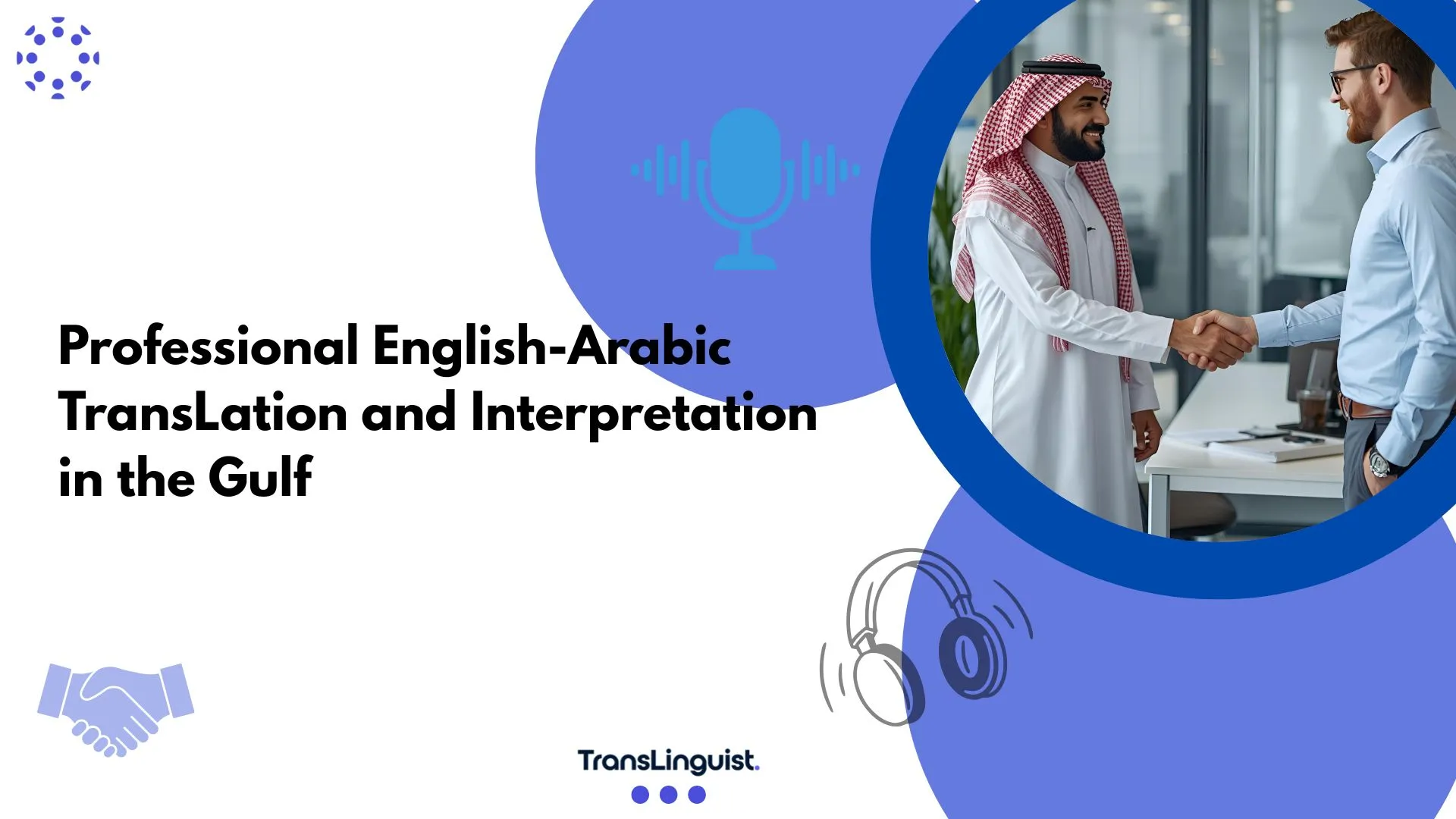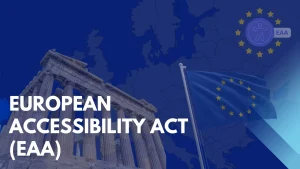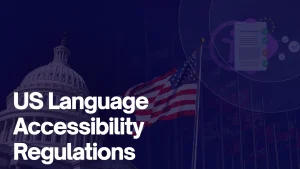Cross-border deals, compliance filings, and public events move fast in the GCC. That’s why English to Arabic can’t be an afterthought—it’s an operating requirement. From RFPs and regulatory notices to board briefings and HSE training, English-to-Arabic choices determine whether instructions are followed and risk stays low. If your teams plan English to Arabic alongside interpreting for meetings and events, communication gets clearer, reviews get shorter, and outcomes improve without adding headcount.
Why the Gulf context is different
The region blends global business with local law, multilingual workforces, and high-stakes public communications. You’ll navigate Modern Standard Arabic (MSA) for formal text, Gulf dialects for day-to-day speech, and mixed English for contracts, specs, and vendor onboarding. Add bilingual government touchpoints, swift procurement cycles, and diverse audiences (citizens, residents, visitors), and it’s clear: language choices here are not cosmetic; they’re operational.
Translation essentials that protect clarity
- MSA vs. dialect: Use MSA for official documents, press, and signage; reserve dialect nuance for voice-over, community outreach, or CX copy where it truly helps.
- Terminology management: Energy, finance, aviation, healthcare, and construction each carry dense lexicons. A living glossary and style guide keep terms consistent across tenders, SOPs, and training.
- Right-to-left (RTL) layout: Arabic typography, number formats (Arabic-Indic vs. Latin), and mixed LTR/RTL tables require experienced DTP so labels, captions, and tables don’t break.
- Certification & formatting: Some use cases require attested translations or specific seals and page layouts. Plan the attestation path at scoping, not after sign-off.
- Review paths: Subject-matter review (legal, clinical, technical) and QA passes for figures, units, and names reduce the back-and-forth that burns time near deadlines.
- File flow for English to Arabic projects: Share editable source files, previous translations, and audience notes up front to speed scoping and protect consistency.
Interpreting across the GCC: choosing the right mode
- Simultaneous conferences, shareholder meetings, policy briefings, and large trainings—keep the flow intact.
- Consecutive for negotiations, site walk-throughs, and executive interviews—maximizes precision.
- Whispered (chuchotage) for a single VIP in a small room.
- Remote (RSI/VRI) for hybrid boards, vendor calls, or urgent announcements when travel or security blocks on-site coverage.
Quality hinges on pre-briefs (agenda, names, acronyms), disciplined turn-taking, and workable audio/video—simple habits that prevent misinterpretation and save minutes on the clock.
Sector snapshots: where precision pays for itself
- Energy & utilities: HSE inductions, permit-to-work training, and shutdown schedules need consistent wording across contractors.
- Financial services: KYC/AML disclosures, Islamic finance documentation, and investor relations demand tight terminology and clean layouts.
- Public sector & smart cities: Bilingual notices, emergency messaging, and procurement documents must be understood the first time.
- Healthcare & life sciences: Patient instructions, consent forms, and CME events pair written clarity with live interpreting.
- Aviation & logistics: SOPs, safety cards, and ops briefings rely on absolute brevity and consistent phrasing.
Quality framework your legal and ops teams can trust
- Scoping: define audience, markets, and deliverables (file types, RTL requirements, attestation).
- Glossary + style: lock approved terms, numerals, date formats, and tone; revisit quarterly.
- Two-step review: linguistic QA plus SME review where the stakes are high.
- Security: encrypted file transfer, least-privilege access, and documented retention.
- Metrics: track rework rate, review cycles, on-time delivery, and downstream tickets to prove ROI.
- Mid-stream checks: for English to Arabic work, confirm numerals, units, and proper nouns at milestone reviews to prevent last-minute fixes.
Where technology helps (and where humans must lead)
Speech-to-text and machine translation can speed drafts for internal use, but high-visibility content, safety comms, and public statements need human editorial control. Remote simultaneous interpreting keeps hybrid events inclusive; live captions increase accessibility and post-event findability; transcripts (when policy allows) create auditable records. The winning blend is human judgment on top of efficient tools.
How TransLinguist supports Gulf programs
- Translation & Transcreation: Contracts, tenders, safety manuals, signage, and CX copy in polished Arabic with RTL-perfect DTP and glossary control.
- TransLinguist Interactive (Remote Interpreting): Secure on-demand or scheduled English↔Arabic interpreting for boardrooms, webinars, and site calls—single or team interpreters.
- Live Captions & Subtitles: Real-time captioning for briefings and conferences; export transcripts for internal reference where appropriate.
- Sign Language Interpretation: Coverage for public events and accessibility programs, coordinated with your AV team.
With one provider aligning terminology and assets across translation and interpreting, you avoid the “two versions of truth” problem that derails reviews.
A buyer’s checklist for first-time success
- Define audience, markets, and channels (web, print, stage, hybrid).
- Confirm direction and scope—English to Arabic and Arabic to English—and whether dialect nuance is desired.
- List deliverables (file formats, DTP, captions, transcripts, attestation).
- Share names, acronyms, and past translations to seed the glossary.
- Pick interpreting mode(s) and venues—on-site, remote, or hybrid—with a backup plan.
- Set security and retention expectations in writing.
- Agree on KPIs (rework rate, approval time, event satisfaction).
- Schedule a short retro after the first milestone to lock improvements.
Mid-project realities and practical fixes
Timelines tighten, speakers change, and slides arrive late. Keep momentum by assigning a single owner for assets, using versioned glossaries, and pre-booking interpreters for likely overflows. When slides update minutes before showtime, share only the changed pages; interpreters don’t need the entire deck re-sent. For documents, comment at paragraph level rather than embedding screenshots—reviewers move faster and errors drop.
Conclusion
Clear bilingual communication is a capability, not a one-off purchase. When teams standardize English-to-Arabic processes and pair them with the right interpreting mode, they reduce risk and move decisions forward. The result is cleaner documents, smoother meetings, and messages that land the first time—whether you’re issuing a policy, running a plant turnaround, or speaking to investors.
Ready to operationalize language access across your GCC programs? Talk to TransLinguist about a lean mix of translation, RTL-correct DTP, remote/on-site interpreting, and captions—so English to Arabic becomes the easiest part of your timeline.
FAQs
Should we request MSA or a Gulf dialect?
For official documents, press, and signage, choose MSA. Use dialect nuance only where it improves connection (e.g., voice-over or community engagement) and won’t confuse broader audiences.
What files do you need to quote accurately?
Editable source files (DOCX, PPTX, IDML), any legacy translations, and brand/style assets. Share audience, tone, and whether attestation or RTL DTP is required.
How much prep do interpreters need for high-stakes meetings?
A short brief—agenda, names, acronyms, and slides—shared 24–48 hours ahead yields faster, cleaner sessions. For large events, consider team interpreting.
Can machine translation handle our policies?
It can be drafted for internal review, but public-facing or safety-critical text needs human editing and quality checks. Use MT + human in the loop only when risk is low.



